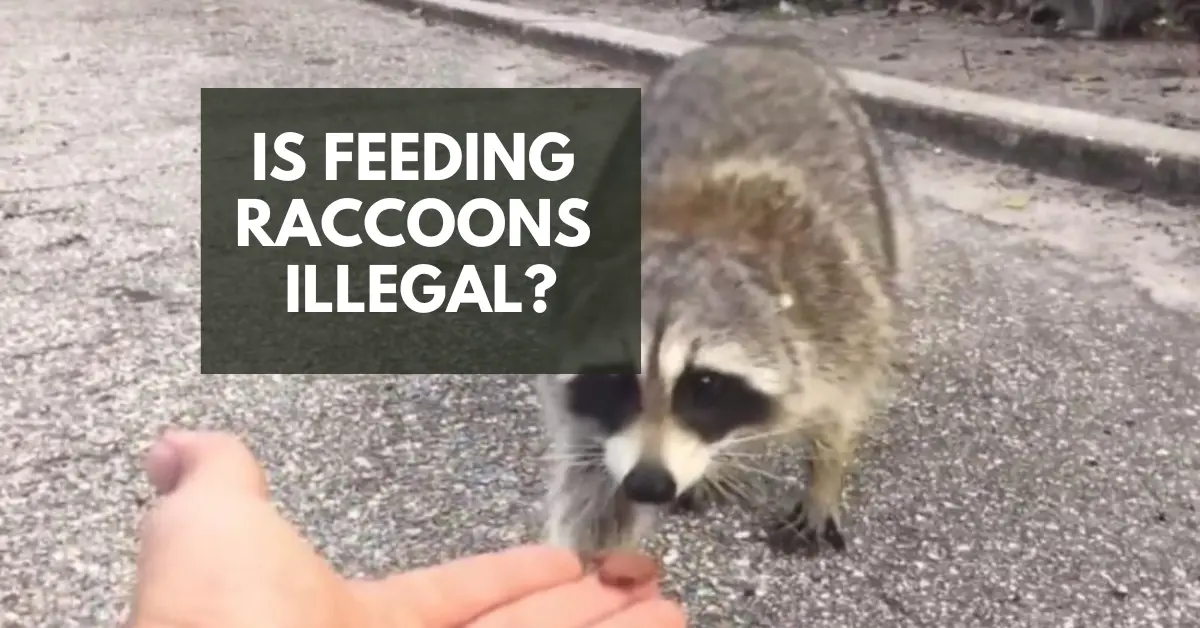Is Feeding Raccoons illegal in Your State?

It is strongly discouraged or outright prohibited in many areas to feed raccoons and other wildlife. Here are some reasons why feeding raccoons can be problematic or illegal:
- It reduces the fear raccoons have for humans, making them more likely to approach homes and people for food, which poses risks to public health and safety.
- Feeding raccoons can lead to overpopulation because, with a readily available food source, their numbers can quickly increase.
- It facilitates the spread of diseases by allowing a large number of raccoons in one area to feed because raccoons are known carriers of diseases like rabies.
- When people cease feeding raccoons, they may resort to aggressive foraging behaviour, causing property damage by raiding homes, trash cans, and other areas in search of food.
- Raccoons can become accustomed to human feeding and engage in nuisance behaviour or property damage, and this may need to be euthanized especially if they can no longer fend for themselves in the wild.
Many cities, counties, and states have clear laws against feeding wildlife, especially high-risk carriers of diseases like raccoons and skunks. For instance, states such as California, Florida, Illinois, and Tennessee explicitly forbid feeding raccoons and other wildlife. Before offering food to wild animals, it’s essential to check your local regulations. In general, it’s best to refrain from feeding them altogether.
Contents
What Happens if You Feed a Raccoon?
These creatures, along with their waste, can pose a health risk as they can spread diseases. While they may resemble stray cats or dogs, raccoons are known to be carriers of illnesses such as leptospirosis and rabies. Although raccoons on a norm fear humans, consistent feeding may cause them to lose this fear and become aggressive in their quest for food.
For emphasis well-fed raccoons can quickly multiply, turning your property into a raccoon haven. It’s important not to let your home become a raccoon habitat. Working with a professional team is advisable to safely remove and humanely prevent wildlife encounters.
Remember, your garbage or pet food isn’t a suitable food source for these animals. Learn how to remove them humanely and return them to their natural environment and diet, it is better to refrain from feeding raccoons in an illegal way to save yourself from unnecessary events that may come up.
Why You Should Not Feed Raccoons
Raccoons are wild animals on the hunt for an easy meal, and feeding them only encourages them to return for more. While you may think you’re being kind by offering different food to these furry visitors, you are putting your family and pets at risk.
There are different firsthand consequences of attempting to hand-feed animals, it is not advisable. Raccoons can sometimes carry rabies, which can spread through bites, urine and faeces which may harbour diseases. Raccoon secretions, for example, can transmit leptospirosis, a bacterial infection that can lead to flu-like symptoms or even kidney and liver issues. While skunk spray isn’t typically dangerous, it can irritate the eyes and cause temporary blindness. The bottom line: It’s best to avoid feeding them and enticing them onto your property.
Instead of feeding raccoons or other wildlife animals and risking harm to your loved ones, a smarter approach is to deter them from entering your property. Simply hook up this motion-activated sprinkler to your water supply. When an animal approaches, the infrared sensor detects the movement and triggers the water to burst out on the animal. The sudden sprays and clicking sound upon activation startled even the boldest critters, preventing them from returning.
How to Talk to Someone Feeding Raccoons in an illegal Way
Bringing up a situation involving wild animal sightings or feeding can feel uncomfortable, as your neighbour might think they’re being helpful. Make sure you don’t trespass if you decide to talk to them in person. To play it safe, consider giving them a call or sending an email instead. Politely share your concerns and listen to their perspective.
If your neighbour is unwilling to stop feeding raccoons illegally, it’s okay to step back and let authorities take charge. You’re not legally obligated to warn your neighbour that you’ll involve the police or wildlife organizations. However, as a courtesy, you can let them know that continued feeding of wild animals could prompt you to report it for everyone’s safety.
Remember that spreading rumours, distributing flyers, or posting on social media about the person could lead to a defamation lawsuit. If you can’t prove their actions, it may become a matter of your word against theirs in court. It’s best to let authorities handle the situation.
How to Stop Feeding Raccoons
Ever walked outside in the morning and discovered your bird feeder knocked over, with a squirrel munching away on the scattered seeds? Or perhaps the feeder is still hanging, but it’s damaged, with the lid broken or perches missing?
Believe it or not, the culprit behind this mischief is rarely the squirrel itself. While squirrels might nibble on feeders, identified by the scrape marks left by their front teeth, they typically lack the strength or dexterity to lift or dismantle large feeders. Instead, the real troublemakers often work the night shift — raccoons. The squirrel is just taking advantage of the situation.
Raccoon damage can happen throughout the year, but it tends to peak during late spring. This is when raccoons become more aggressive in raiding feeders, mainly because female raccoons have babies to feed. As these babies grow, they demand more milk from their mothers, prompting increased foraging. Raccoons are notorious for their strong teeth, so even feeders containing fruit, jelly, or nectar aren’t safe. Eventually, the young raccoons will leave their dens and join their mothers at the feeders.
To protect your feeders from raccoons and save on birdseed costs, you have different options, let us check them together, and these steps can also help you stop feeding raccoons in an illegal way.
1. Secure Feeders Indoors Each Night
Given that raccoons are known to be active at night, storing feeders in a locked garage or shed before dusk each evening can prevent them from accessing the food. While this approach may be somewhat inconvenient and may not suit everyone’s schedule, it can be strong in keeping raccoons at bay.
2. Ensure Feeders are Secure and Monitor Food Consumption
There are various devices to help prevent raccoons from knocking feeders to the ground. Solution Clips can be placed over the ends of shepherd’s hooks to prevent raccoons from lifting feeders off. Utility Chains help securely hang feeders from tree limbs, and you can try feeders that can be securely attached to trees or fences.
Once your feeders are properly secured, monitor how much seed your birds consume daily, and adjust the amount of food rationed out each morning accordingly. If feeders are emptied by dusk, raccoons are less likely to be attracted to the area due to lack of food.
3. Install Raccoon Baffles
Incorporating a steel raccoon baffle onto your feeder pole is highly effective in deterring raccoons. Unlike squirrel baffles, raccoon baffles are larger, with a diameter of about 10 inches and a height of approximately 2 feet, making it challenging for raccoons to reach over or climb over them.
Proper placement is crucial, so don’t hesitate to seek guidance if you don’t get the placement. If you have a smaller feeder hanging from a tree, a large overhead baffle may suffice, although the success depends on the feeder shape and branch layout. Investing in baffles can lead to great savings in seed costs by deterring raccoons.
4. Spice Things Up
Since raccoons are known to hate pepper, you can use them to send raccoons away from your yard and property. You can use hot pepper suet cakes, hot pepper suet cylinders, and hot pepper seed and nut cylinders. Birds don’t feel the heat like mammals do, so they’re not bothered by the hot pepper.
However, most raccoons take one taste and stay clear. Note – it is advisable not to mix loose pepper powders into seed blends, as they can become airborne and inhaled. The pepper bound into the suet and cylinders doesn’t pose this risk.




